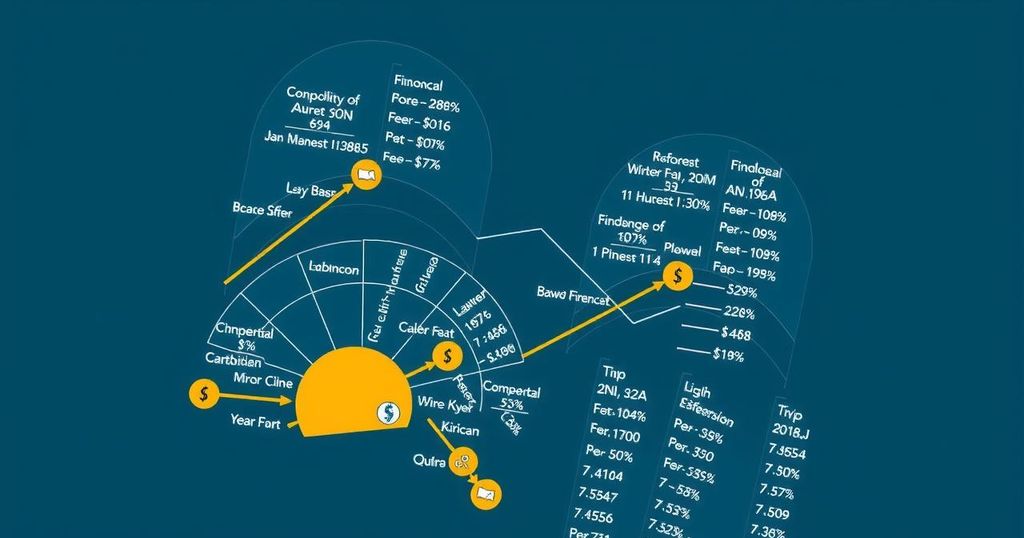IMF Urges DRC to Streamline Financial Management in New Funding Deal

The IMF urges the DRC to implement a Treasury Single Account and undertake tax reforms as conditions for a $2.9 billion funding deal. The agreement, including $1.77 billion from the ECF and $1.1 billion from the RSF, aims to enhance financial management and increase domestic revenue. Current financial inefficiencies, with over 3,600 government accounts, necessitate these reforms to improve fiscal credibility and public expenditure oversight.
The International Monetary Fund (IMF) is urging the Democratic Republic of Congo (DRC) to establish a Treasury Single Account (TSA) consolidating thousands of government accounts to enhance financial transparency as part of a new $2.9 billion funding agreement. This initiative aims to streamline public resource management, expenditure procedures, and tax reforms necessary for the DRC to qualify for funds from the IMF’s Extended Credit Facility (ECF) and a novel climate-focused facility. The DRC’s existing fragmented account structure complicates public financial management, necessitating this push for efficiency and reform. The financing agreement specifies that the DRC will receive $1.77 billion through the ECF and an additional $1.1 billion from the Resilience and Sustainability Facility (RSF). To access these resources, Kinshasa must expedite the implementation of the TSA and adopt various tax reforms to enhance domestic revenue generation, which includes improvements in VAT billing, tax exemption regulations, oversight of mineral exports, and customs fraud prevention. Currently, there are over 3,600 government-related accounts, which the IMF identifies as too many, leading to inefficiencies and a lack of budget credibility. As stated by Calixte Ahokpossi, the IMF mission chief for the DRC, “A key priority under the planned ECF-supported programme is to ensure stricter adherence to the public expenditure chain procedures.” The TSA is expected to considerably improve the overall fiscal credibility of the DRC government. In conjunction with the TSA implementation, the IMF recommends decentralizing spending authority to line ministries, taking pressure off government expenditure and bolstering economic resilience via improved investment and social spending framework. However, the movement toward a streamlined financial structure must overcome the current weak cash management practices. The IMF has noted that although the DRC officially began establishing the TSA with a decree in May 2023, significant work remains to be completed. The IMF’s advice is not isolated to the DRC; similar reforms have been advocated for other nations in the region, like Uganda and Tanzania, which have successfully adopted the TSA, while Kenya is in the process of implementing it. The need for enhanced tax measures and improved public financial management reflects a broader regional challenge, often met with public resistance. Nevertheless, the new funding aims to enable the DRC to address important social priorities while concurrently restoring security and stability in its eastern regions.
The International Monetary Fund (IMF) frequently collaborates with countries to enhance their financial systems and institutions, especially in regions where governance and fiscal policies may be underdeveloped. The IMF’s current initiative in the Democratic Republic of Congo aims to consolidate numerous government accounts into a singular Treasury Single Account (TSA). This approach is based on the belief that by centralizing financial resources, governments can better manage public funds, increase accountability, and improve fiscal outcomes. The DRC, which has faced chronic governance challenges, is crucial for implementing these reforms, particularly as it seeks funding and support to facilitate economic growth and sustainability.
The IMF’s push for a Treasury Single Account and comprehensive tax reforms in the DRC is pivotal in addressing the country’s public financial management inadequacies. The proposed reforms are aimed at consolidating government accounts for improved transparency and efficiency, alongside enhancing revenue mobilization to support the nation’s development goals. By implementing these changes, the DRC can unlock significant international funding, potentially transforming its economic landscape and mitigating ongoing regional instabilities.
Original Source: www.theeastafrican.co.ke








